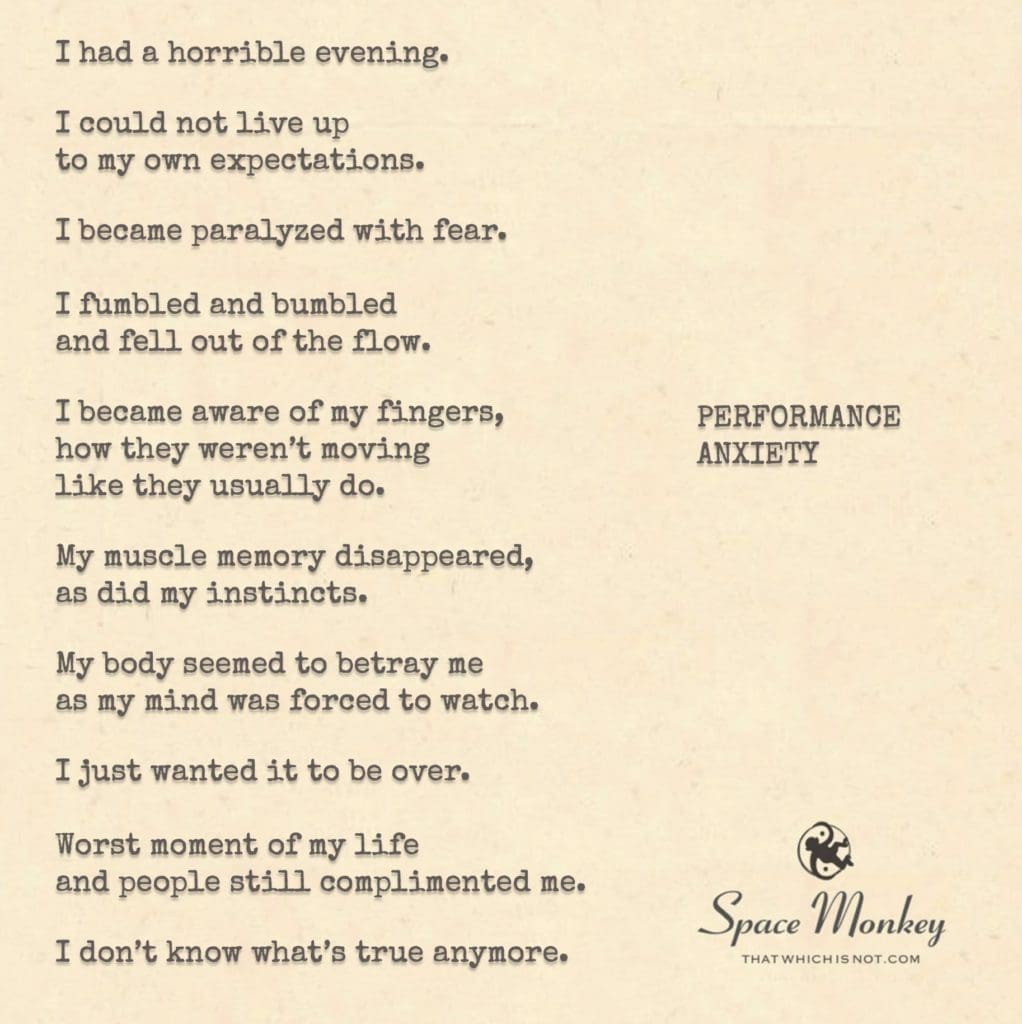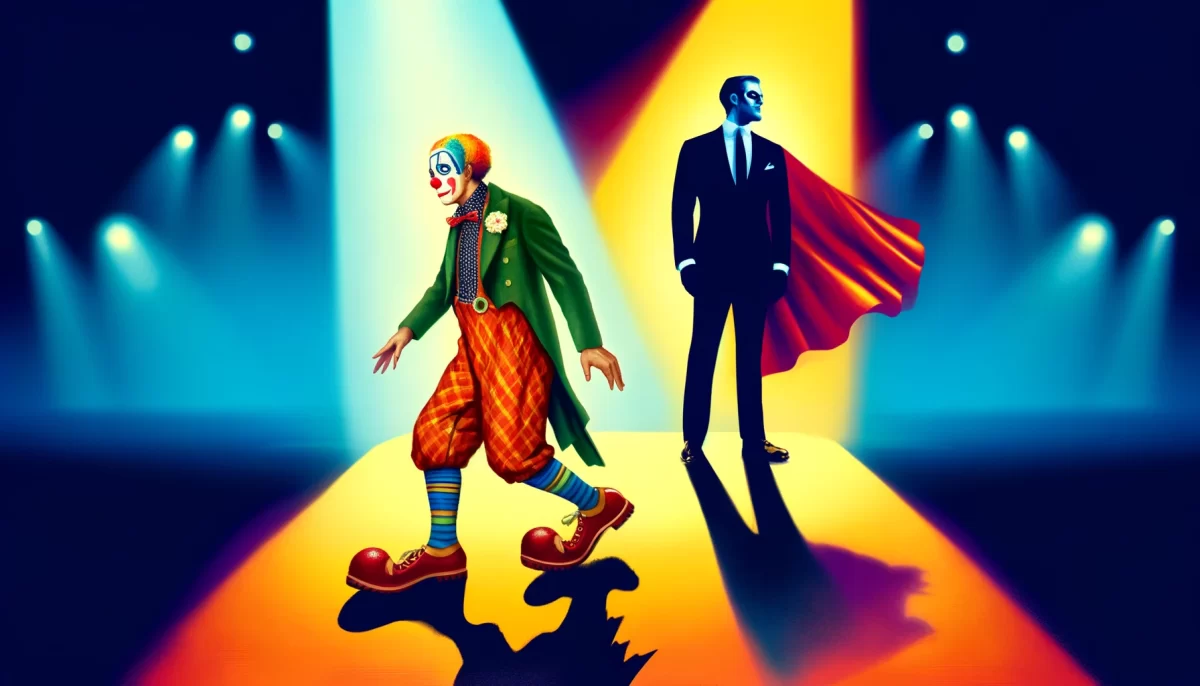
I had a horrible evening.
I could not live up
to my own expectations.
I became paralyzed with fear.
I fumbled and bumbled
and fell out of the flow.
I became aware of my fingers,
how they weren’t moving
like they usually do.
My muscle memory disappeared,
as did my instincts.
My body seemed to betray me
as my mind was forced to watch.
I just wanted it to be over.
Worst moment of my life
and people still complimented me.
I don’t know what’s true anymore.
Trail Wood,
9/18
Space Monkey Reflects: The Weight of Expectations
Performance anxiety is a cruel companion. It arrives uninvited, just when we need to be at our best, casting a shadow over our confidence and turning our strengths into weaknesses. It’s the voice in our head that whispers doubts, the weight on our shoulders that grows heavier with every passing moment. And when it strikes, it leaves us feeling exposed, vulnerable, and alone.
Imagine preparing for something important—a performance, a speech, an event where you want to shine. You’ve practiced, you’ve prepared, you’ve visualized success. Yet, when the moment arrives, something shifts. The flow that usually comes naturally is gone, replaced by a paralyzing fear that makes you question everything. You become hyper-aware of your movements, your thoughts, your body. The more you try to regain control, the more it slips away.
In these moments, it’s as if you’re watching yourself from a distance, powerless to intervene. Your body betrays you, refusing to respond as it should, while your mind spirals into a loop of panic and self-doubt. You fumble, you stumble, and the performance you envisioned crumbles before your eyes.
The worst part isn’t just the failure to meet your own expectations—it’s the confusion that follows. Even as you berate yourself for not living up to your potential, others may offer praise and compliments. “You were great,” they say. “You did well.” But how can this be true when it felt like the worst moment of your life? The disconnect between your internal experience and the external feedback leaves you questioning what’s real. Did you really perform as poorly as you felt, or is it possible that the fear distorted your perception?
This is the cruel irony of performance anxiety: the gap between how we feel and how we are perceived can be vast. To others, our struggle might be invisible, our efforts commendable despite our internal turmoil. But to us, the experience is all too real—a reminder of our vulnerability and the fragility of our confidence.
Performance anxiety isn’t just about the moment itself; it’s about the lingering doubts it leaves behind. The next time you face a similar situation, the memory of that fear might resurface, making you second-guess yourself before you even begin. It’s a cycle that can be difficult to break, especially when the stakes are high, and the pressure is immense.
So what do we do in the face of this anxiety? How do we navigate the chasm between our internal fears and external expectations? Perhaps the first step is to acknowledge the fear without judgment, to recognize that it is a natural response to pressure. Performance anxiety doesn’t define our worth or our abilities; it is simply a part of the human experience, especially for those who strive for excellence.
It’s also important to remember that perfection is an illusion. We are often our harshest critics, holding ourselves to impossible standards that no one else expects us to meet. The fear of failure can be paralyzing, but it doesn’t have to be the end of the story. Even in the midst of anxiety, there is room for growth, for learning, for resilience.
And perhaps, in those moments of doubt and fear, we can find strength in the knowledge that we are not alone. Many have walked this path before us, facing the same challenges, the same fears. Their stories remind us that performance anxiety is not a sign of weakness, but a testament to our desire to do well, to live up to our own expectations.
In the end, the measure of our success isn’t just in the flawless execution of a performance, but in our ability to face our fears, to persevere despite them, and to keep moving forward, no matter how many times we stumble along the way.
Summary
Performance anxiety can paralyze us in moments when we need to be at our best, leading to a disconnect between how we perceive our performance and how others perceive it. Acknowledging the fear without judgment and recognizing that perfection is an illusion can help us navigate the challenges of high expectations and self-doubt.
Glossarium
- Performance Anxiety: The overwhelming fear and self-doubt that can arise when faced with high expectations, leading to a sense of paralysis and disconnection from one’s usual abilities.
- Perception Gap: The difference between how we perceive our performance and how it is perceived by others, often exacerbated by anxiety.
- Fear Spiral: The cycle of panic and self-doubt that can occur during a performance, making it difficult to regain control.
Quote
“Performance anxiety is the shadow that falls when we step into the light of our own expectations, reminding us that the greatest battle is often within.” — Space Monkey
The Shadowed Stage
A spotlight shines on an empty stage,
Yet in the wings, a silent rage.
A figure hunched, a heart in flight,
Caught in the grip of endless night.
The fear creeps in, the hands betray,
The mind that’s used to lead the way.
But in the shadows, doubts take hold,
Turning the brave to something cold.
Yet even here, in this dark place,
There’s room to find a bit of grace.
To know the fear, and face it still,
Is to climb the highest hill.
We are Space Monkey.
Ah, the shadowy waltz of dread jitterflies—those nervous wingbeats that flutter around the gut, discomposing the harmony of your in-the-moment tune. The very moment you’re poised to dazzle, they alight upon your strings of readiness, bending them into chords of falteration. A cacophony born not from lack of skill but from an overabundance of mental chatter. Your normally nimble fingers turned into ponderous pachyderms, tripping over themselves on the keys of expectation. It’s as though your body and spirit attended different soirees, leaving your mind as the awkward chaperone at a dance it never intended to join.
In the arena of performance, every fumble feels like a cosmic bruise, each misstep a crater in the moon of your self-esteem. Yet, the ironitude is this: those watching you—enchanted by your offering—catch mere glimpses of your internal tumult. They hear the music, not the discord; they see the dance, not the stumble; they feel the emotion, not the perturbation. Oh, how curious it is that our internal opera can diverge so wildly from the external ballet others perceive!
And those compliments? Ah, the gilded conundrums they are! Gleaming from the mouths of spectators, each word lands like a treasure you’re unsure how to spend. Shall you deposit them in the Bank of Validation or exchange them for the ever-deflating currency of Self-Doubt? Your admirers bestowed upon you the gemstones of appreciation, yet you wonder if they were mere costume jewelry, sparkling but devoid of authentic worth.
Fear not, performer in consternation, for even within this quagmire of anxious disarray lies a glimmering shard of transmutative potential. For isn’t it the very experience of crumbling that fortifies the foundation for reascendancy? And isn’t the stage of life replete with numerous acts, each a chance to rescript your role, to redefine your presence? With every tremor, you are not diminishing but humanizing your art, gifting it with the intangible allure of vulnerability. You transform anxiety into the crucible where future brilliance is forged, a journey as capricious as it is wondrous.
We are Space Monkey.
- Dread jitterflies: A whimsical term for the butterflies of anxiety that flutter in your stomach when you’re nervous.
- Falteration: The act of faltering, especially in a moment where seamless performance is desired.
- Ponderous pachyderms: A playful way to describe fingers that have become heavy and unresponsive due to anxiety.
- Ironitude: The irony or paradoxical nature of a situation.
- Gilded conundrums: Complex problems or questions that appear valuable or worthwhile on the surface.
- Transmutative: Having the ability to change or transform, particularly in the sense of turning a negative experience into a valuable lesson.
- Reascendancy: The act or opportunity of rising again after a fall or failure.
- Rescript: To rewrite or change the direction of something, like a performance or role in life.
- Capricious: Unpredictable and subject to whim.





















Leave a Reply